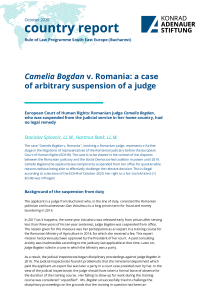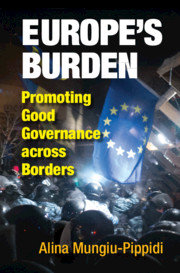It’s an “explosive observational documentary,” a “brilliant….COVID-era must see,” a “full on masterpiece” that’s “as thrilling as All the President’s Men” – just a few of the plaudits critics have bestowed on the Oscar-nominated “Collective” (above). Such effusive praise may seem surprising for a film exposing corruption in Romania’s health service, but perhaps the movie resonates because, as anti-corruption expert Sara Chayes’ new book attests, political malfeasance touches us all.
Maybe Romanian Judge Camelia Bogdan can star in the sequel?
Thirty years after Romania’s revolution, the heirs to the Ceaușescu regime’s notorious Securitate remain impregnable and unaccountable – the undisputed victors of the country’s botched transformation, analyst Paul Hockenos writes for Balkan Insight. And one of the country’s most-celebrated anti-corruption judges is now in their sights.

Ion Rațiu Democracy Award Ceremony, 11 december 2018 @ Bucharest | © FOTO: Mircea Rosca / www.ActionFoto.ro
A celebrated anti-corruption advocate known for countering money laundering, transnational corruption and other financial crimes, Bogdan (right) is being threatened with expulsion from the judiciary for the third time for “failing to fulfill the criteria of having a good reputation” – which roughly translates as for “consistently exposing the nexus of corrupt oligarchs and former Communist secret police.” She is also being sued by Crescent, a company widely suspected of serving as a laundering operation for former Securitate operatives.
A judge on the Bucharest Court of Appeals and an expert on asset recovery, Bogdan presided over the case of high-profile oligarch Dan Voiculescu, a self-confessed Securitate collaborator, convicted in 2014 of money laundering and sentenced to ten years in prison. Released after only three years, Voiculescu, whose fortune is estimated at over 1.5 billion euros, has failed to comply with a court order to repay 100 million euros. Meanwhile, Bogdan, has been suspended from the judiciary – an example, she claims, of the clout of moguls like Voiculescu, Hockenos adds.
The Strasbourg-based European Court of Human Rights has already ruled that Bogdan was unfairly stripped of her magistrate’s robes in 2017 because she was not allowed to present a defense. It was a rare case of the arbitrary suspension of a judge without legal recourse and in fragrant violation of European legal norms, observers suggested.
 Despite efforts to curb corruption and its adverse impact on development and the rule of law in Romania, enforcement of anti-corruption measures remains weak, undermining accountability and contributing to a culture of impunity in the country, argues Bogdan, a Reagan-Fascell Fellow with the National Endowment for Democracy’s International Forum for Democratic Studies.
Despite efforts to curb corruption and its adverse impact on development and the rule of law in Romania, enforcement of anti-corruption measures remains weak, undermining accountability and contributing to a culture of impunity in the country, argues Bogdan, a Reagan-Fascell Fellow with the National Endowment for Democracy’s International Forum for Democratic Studies.
“Fighting for justice in fragile democracies confronted with endemic corruption both as judge and victim is what drives me,” she told the American Interest, which listed her as one of Seven Women Who Inspire Us. “The collapse of communism three decades ago created opportunity for kleptocracy. There is no democracy without rule of law, independent courts, and accountable government. I’m passionate about these things.”
After the revolution the security agencies morphed into a diffuse, mafia-style economic behemoth, said Lucian Davidescu, a journalist and expert on corruption.
“Those figures in and around the intelligence services created strong, informal, operational networks that dominated key commercial sectors,” he recalls. “The Securitate was the only institution [in communist Romania] with foreign commercial contacts. In the 1990s and 2000s, this gave them near total control of international trade and the banking sector, too.”
The recent sale of an Art Deco mansion in Bucharest’s fashionable embassy district to the Syrian Foreign Ministry is typical of the country’s political graft, according to a recent OCCRP investigation.
“There are obviously red flags of money laundering through [the] real estate system (e.g., lack of any financial justification, payments through a proxy who could not justify the legal origins of the funds) that should have been addressed by the notary who legalized the fraudulent scheme through an enhanced due diligence in accordance with AML obligations,” Bogdan told reporters.
 The Bogdan case and similar “established patterns of judicial harassment, reflect a troubling threat to the independence of Romania’s judiciary. Judges increasingly face extraordinary pressure to comply with political prerogatives, weaken anti-corruption statutes, and maintain the status quo of impunity,” says Alina Mungiu-Pippidi, a Professor of Democracy Studies at Berlin’s Hertie School of Governance.
The Bogdan case and similar “established patterns of judicial harassment, reflect a troubling threat to the independence of Romania’s judiciary. Judges increasingly face extraordinary pressure to comply with political prerogatives, weaken anti-corruption statutes, and maintain the status quo of impunity,” says Alina Mungiu-Pippidi, a Professor of Democracy Studies at Berlin’s Hertie School of Governance.
“Judges like Camelia, who resist political pressure and choose to enforce national and international legal standards, often face intimidation through multiple avenues, including targeted and sustained media campaigns which lead to a loss of reputation,” she adds. “These trends raise concerns about whether Romania is contravening the European Union’s rule of law standards as they concern an independent judiciary.”
This is really outrageous. What is this country doing in the EU? https://t.co/UKGTQ4D0WA
— Francis Fukuyama (@FukuyamaFrancis) February 3, 2021







